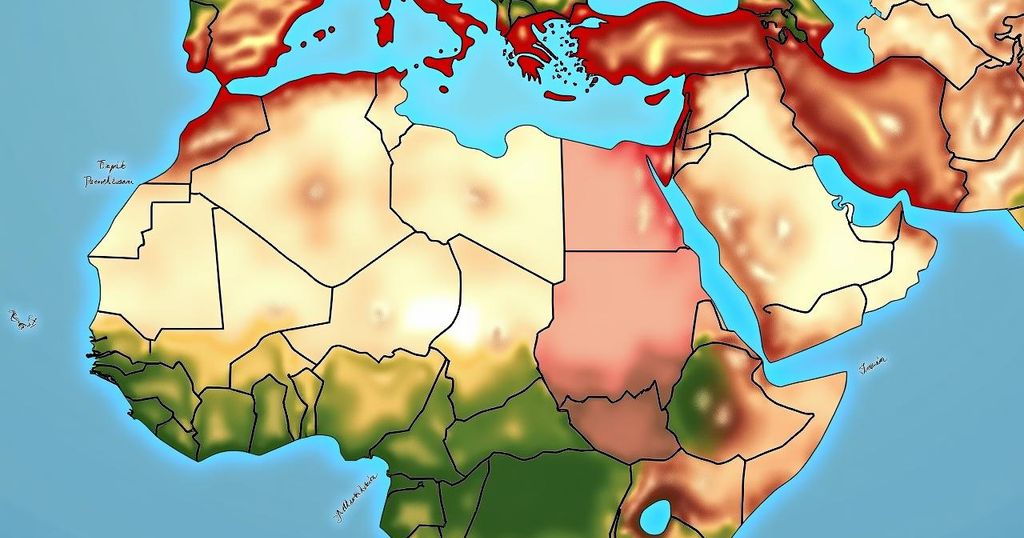Egypt Expands Its Influence in the Horn of Africa Through Strategic Alliances with Somalia and Eritrea

Egypt is fortifying its influence in the Horn of Africa by forming an alliance with Somalia and Eritrea during a recent summit. Despite accusations of military involvement in Sudan, Cairo seeks to counter Ethiopia’s regional power. The alliance is perceived as a strategic bloc against Ethiopia, triggering heightened tensions in the region.
In an endeavor to bolster its regional influence, Egypt has strengthened its foothold in the Horn of Africa through a strategic alliance with Somalia and Eritrea. Recently, President Abdel Fattah Al-Sisi convened with Somali President Hassan Sheikh Mohamud and Eritrean President Isaias Afwerki during a tripartite summit hosted in Asmara. This alliance aims to consolidate their collective power in the region and is perceived as a countermeasure against Ethiopia, amid escalating regional tensions. The timing of the summit is significant, as it follows allegations by Sudanese Rapid Support Forces commander Mohamed Hamdan Dagalo, who accused Egypt of conducting airstrikes against his troops, indicating Cairo’s military involvement in the ongoing conflict in Sudan. This development marks a shift from Egypt’s previously neutral stance in the Sudanese war, reinforcing its image as an assertive regional player protecting its national interests. Throughout this period of heightened tension in the Horn of Africa, the Eritrean government characterized the summit as a means to strengthen bilateral relations and address regional security concerns. However, the underlying objective appears to be the formation of a united front against Ethiopia, especially as Ethiopia recently entered a memorandum of understanding with the Somaliland region pertaining to port and naval facilities in the southern Red Sea. In a statement by the Egyptian presidency, it was emphasized that the visit sought to enhance bilateral collaborations across various sectors and to discuss regional issues. Meanwhile, Ethiopian Prime Minister Abiy Ahmed has responded to Egypt’s increasing engagements in the area by asserting, “We will not allow them to harm us; we will humiliate anyone who dares to threaten us to deter them,” underlining a staunch defense of Ethiopia’s sovereignty. Egypt’s interventionist stance extends beyond diplomatic maneuvers; in Sudan, it has aligned itself with General Abdel Fattah al-Burhan while simultaneously partaking in international mediation efforts. Allegations have surfaced from the Rapid Support Forces accusing Egypt of deploying U.S. weaponry in its military operations. However, Egypt has categorically denied such claims, reaffirming its commitment to Sudan’s stability and the preservation of its governmental institutions. Former Deputy Foreign Minister Ambassador Hussein Haridi emphasized that Egypt has been actively working since the onset of the Sudanese conflict to resolve it, highlighting the adverse consequences for Egypt should the turmoil continue. Conversely, Sudanese political commentator Mohamed Torshin articulated that Egypt stands opposed to armed factions outside the purview of legitimate state institutions due to the potential threats posed to its national security.
Egypt’s strategic interests in the Horn of Africa have come into sharper focus as it seeks to counter the influence of Ethiopia. With the increasing tensions in the region, including the ongoing conflict in Sudan, Egypt is positioning itself as a key player, facilitating alliances to secure its objectives and enhance its geopolitical standing. The summit with Somalia and Eritrea exemplifies this strategy, potentially altering the balance of power in the Horn of Africa, which is characterized by military and diplomatic maneuverings.
In conclusion, Egypt’s recent summit with Somalia and Eritrea signifies its strategic shift towards a more assertive role in the Horn of Africa, particularly against Ethiopia. This action underscores Egypt’s commitment to safeguarding its interests amidst regional conflicts and reflects its broader ambitions to cement its influence in Africa. As tensions mount, the implications of this tripartite alliance may have lasting effects on the geopolitical landscape of the region.
Original Source: www.atalayar.com








